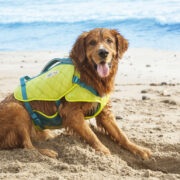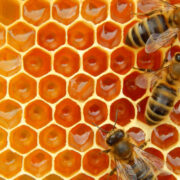There’s nothing more annoying than a pesky fly buzzing around your head, so you can just imagine how your dog feels! You want them to stay away from you and your pet by learning how to keep flies off dogs.
It’s easy enough for us to just swat that pest away, but sometimes your dog can be at the mercy of those irritating insects, so it’s important to know some tips for keeping flies off dogs. Before we get into that, however, let’s look at some reasons why your dog might attract flies.
Why Do Flies Bite My Dog?
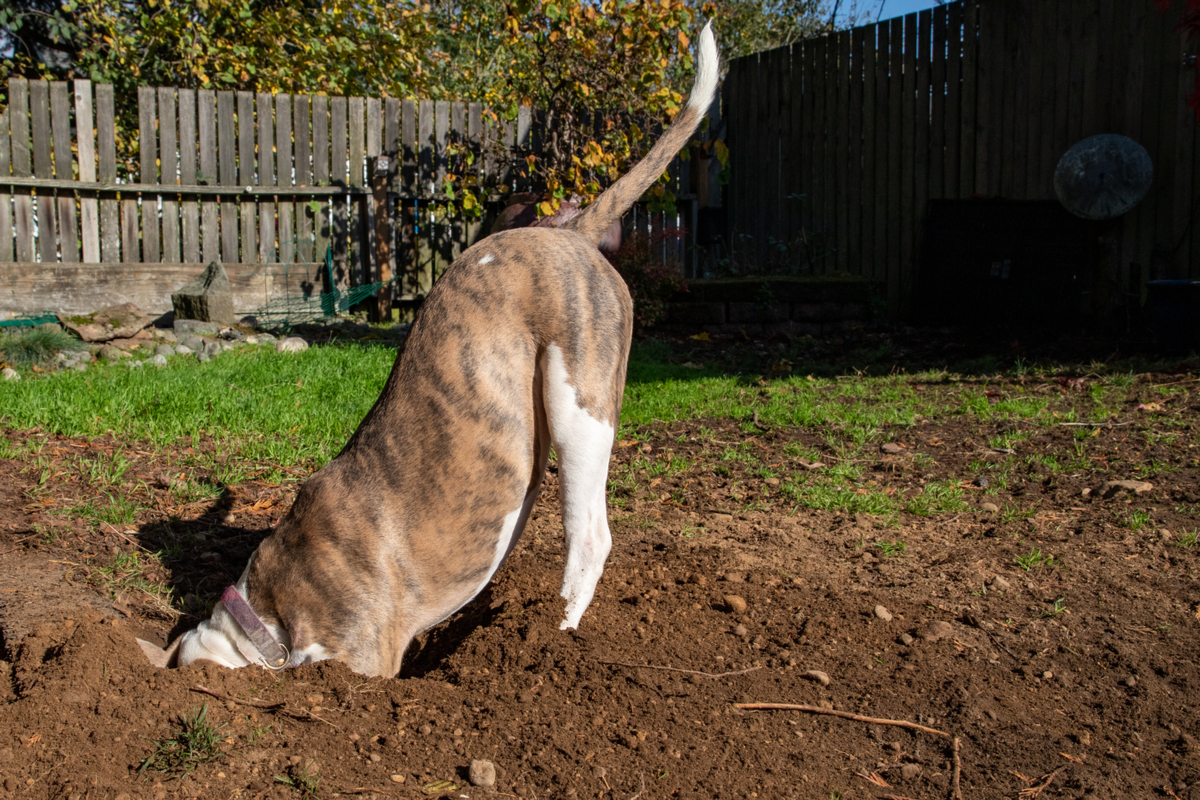
There are several reasons flies might be attracted to your dog. If your dog’s coat is matted or unclean because of a skin condition, illness, or something like diarrhea, it will attract flies. This is common in the area of the perineum near your dog’s anus.
Fecal matter that is caked on in that area can attract flies because they want to lay their eggs there. Fly eggs hatch into maggots and cause an infestation in that part of your dog’s body. This is completely preventable by simply making sure your dog stays clean.
It’s particularly important to help your dog stay clean if he is ill. Many times, a sick dog has trouble keeping himself clean, and he needs a little help from his best friend (that’s you!). It’s also helpful if you keep an ill dog inside.
It’s also true that some flies like to take a bite out of your dog’s ears. Horseflies are an example of this kind of fly. They also will bite his rear end which hurts, and the bites can bleed and even become infected which causes more problems for your pooch.
While these kinds of bites irritate your furry friend, they usually don’t present the same kind of health risk as other types of biting insects like mosquitoes. Mosquitoes carry certain parasites, like heartworms, which can be fatal to your best buddy. That’s why it can be a good idea to use some kind of dog-safe insect repellent to keep the bugs away.
What are the Best Ways to Keep Flies Off Dogs?
So, how do you keep flies off dogs? There are a number of easy things you can do to keep flies off your dog. Let’s start with the basics.
Keep Your Dog Clean and Healthy
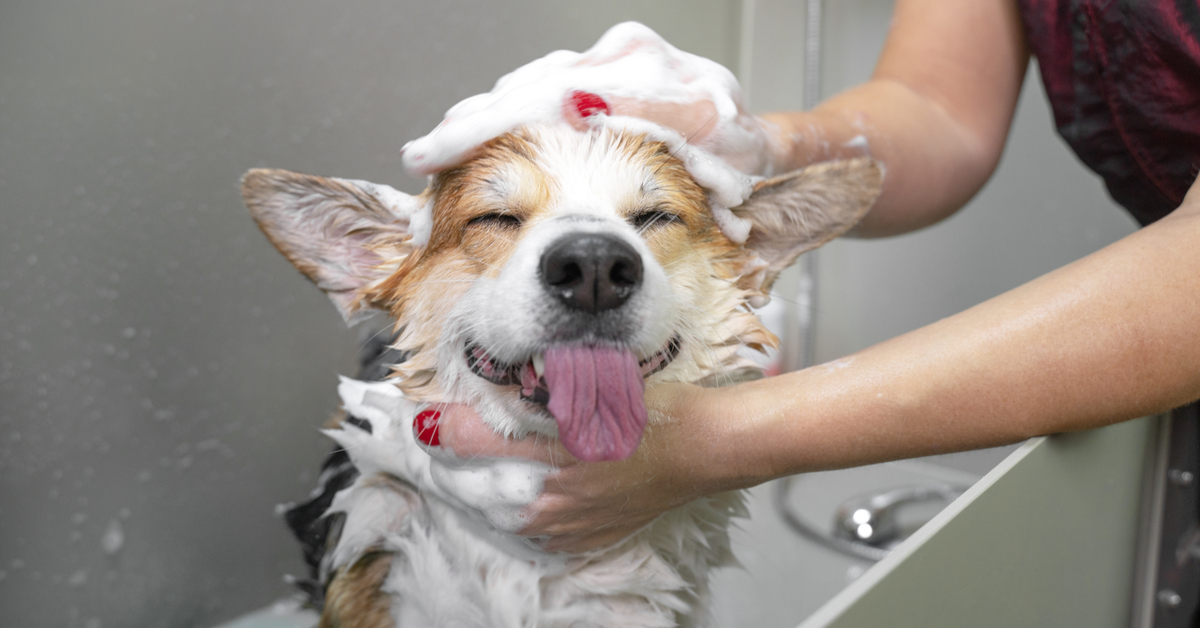
Just keeping your pooch clean and healthy will help you get rid of flies around him. Sometimes that’s easier said than done, but there are some things that can help. You’ll want to groom him regularly since flies love dirt and odors.
It’s particularly important to keep the area around his genitals and anus clean and trimmed so that that area doesn’t get matted or dirty. Regular bathing and grooming will help him stay squeaky clean and free of flies.
If biting flies are attacking a particular area on your dog — like his ears — you can solve that problem by applying petroleum jelly to that area. There are also some other safe insect repellents you can use like apple cider vinegar or lemongrass essential oil.
In fact, lemongrass essential oil has actually been tested and proven to repel stable flies, and if you’ve ever been around a stable, you know how pesky those flies can be!
Other essential oils with fly repellent properties include Idaho tansy, geranium, sandalwood, rosemary, and lavender.
If you’re interested in making your own essential oils fly spray for your pup, just dilute between five and ten drops of your preferred essential oil in a 32-ounce spray bottle filled with distilled water. Be sure to shake it well before you spray it on your dog.
Avoid getting it in his eyes, nose, or mouth, and never apply essential oils without first diluting them in water. Pure oils can be irritating to his skin. There are also some essential oils that are fine for people but not for their furry friends.
As always, it’s also wise to consult your veterinarian before applying anything topically on your dog’s skin. It is possible that if he licks it off, it could cause some gastrointestinal irritation.
Essential Oils that are Poisonous for Your Dog
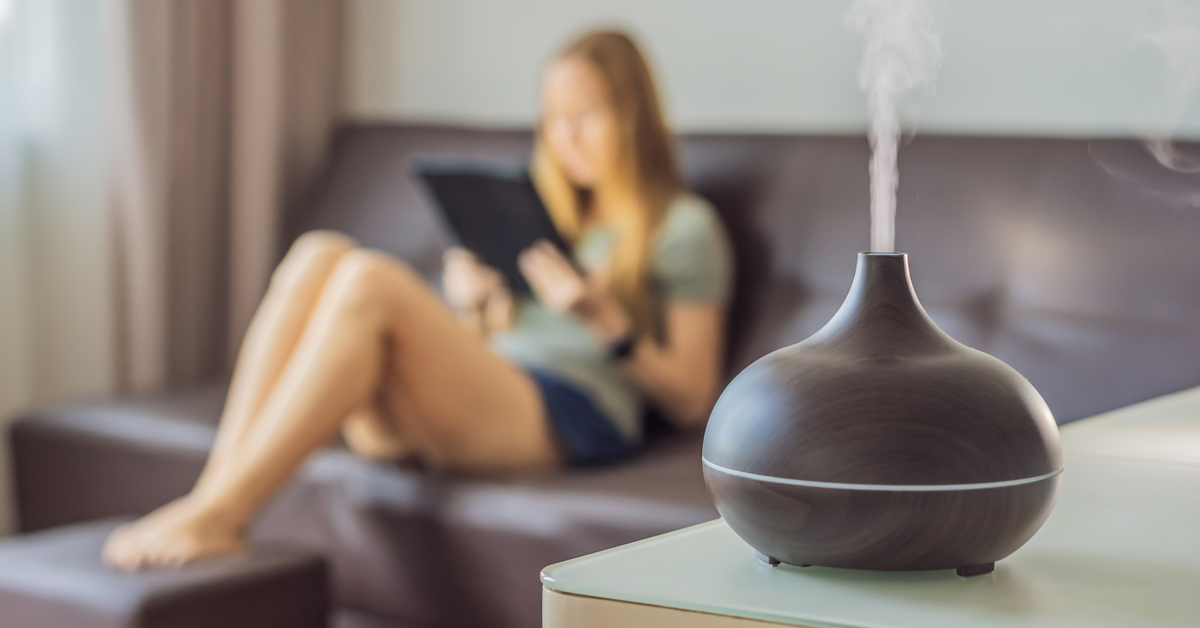
Some essential oils can be poisonous for your dog, so you’ll want to avoid using them. Though not a complete list, the following essential oils can cause more problems than they solve:
- Tea tree oil;
- Pennyroyal;
- Oil of wintergreen;
- Pine oils;
- Cinnamon oil
- Citrus oils
- Peppermint oil;
- Sweet birch oil;
- Ylang-ylang oil.
Most of these require a high dose to cause problems, but it’s just best to avoid using them as a fly repellant. Another important consideration for keeping flies off dogs is their environment.
How to Keep Flies Off Dogs: Keep Your Dog’s Environment Clean
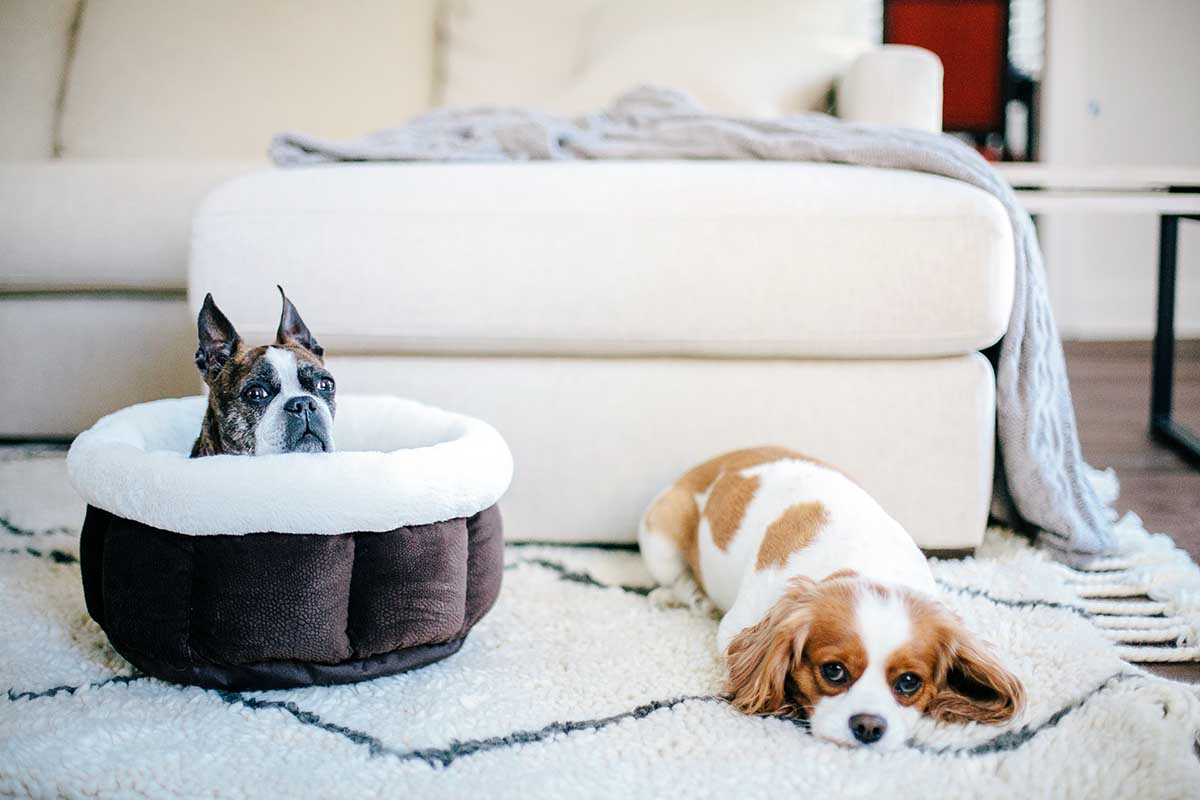
Another important consideration for keeping the flies away is your dog’s environment. The following are several things you need to do to keep the biting flies at bay.
Pick Up Your Dog’s Food
After your dog’s done eating, be sure to pick up his food bowl and wash it right away. Feed your dog at a specific time and clean up his food bowls immediately after he eats. This will help you prevent any fly infestations from getting started.
Wash Your Dog’s Bedding
This should be done at least once a week so that it won’t accumulate stains or smells that can attract flies. It will also get rid of any fly eggs that can hide in the fabric.
Dog beds should be washed with pet-friendly soap and hot water. Afterward, you can sprinkle baking soda on the bedding to get rid of any lingering odors. Leave it on for about 15 minutes and then vacuum it up.
Clean Your Dog’s Kennel Area
You don’t want to leave bones or food out in his kennel since that will attract flies. Additionally, if his kennel is dirty and smells bad, you can bet it will attract biting flies.
Clean Up Your Dog’s Poop
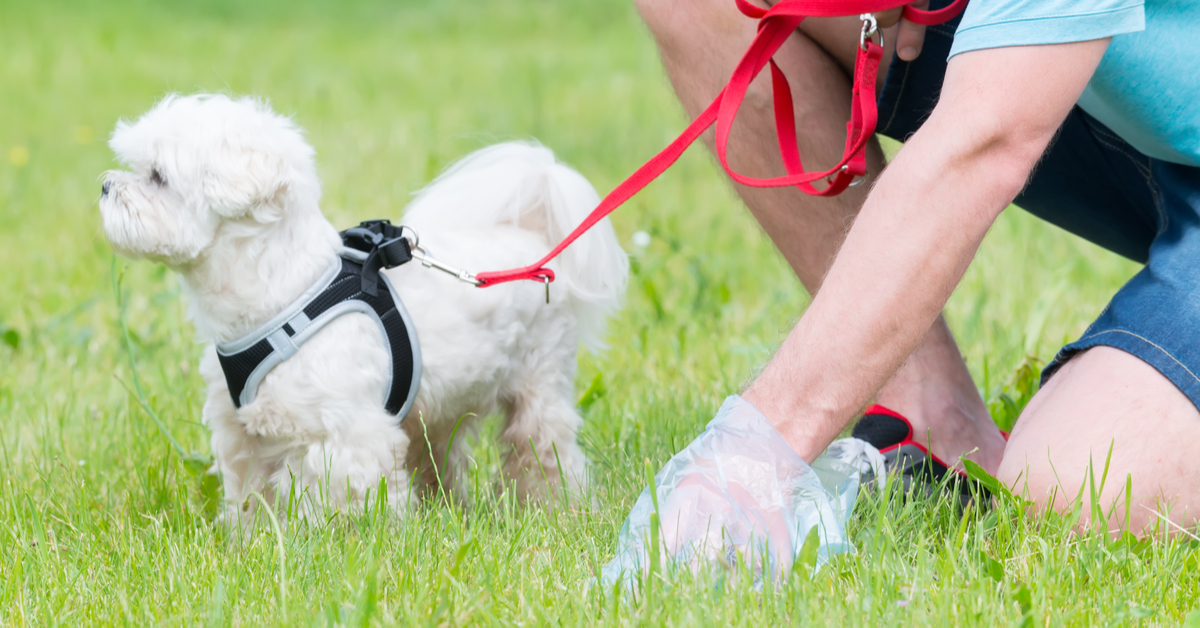
Flies are attracted to dog feces because that’s where they lay eggs that hatch out into maggots. Maggots feed on dead matter and your doggy’s poop is full of that. By cleaning up the yard and keeping it free of poop, you’ll get rid of flies in the area.
Clean Up the Trash Around Your Home
It’s also important to keep your home free of trash. Trash attracts biting flies which will then move on over to your faithful doggy when they get done feasting on the garbage. Garbage smells bad and that attracts flies quickly.
Vacuum the Carpet
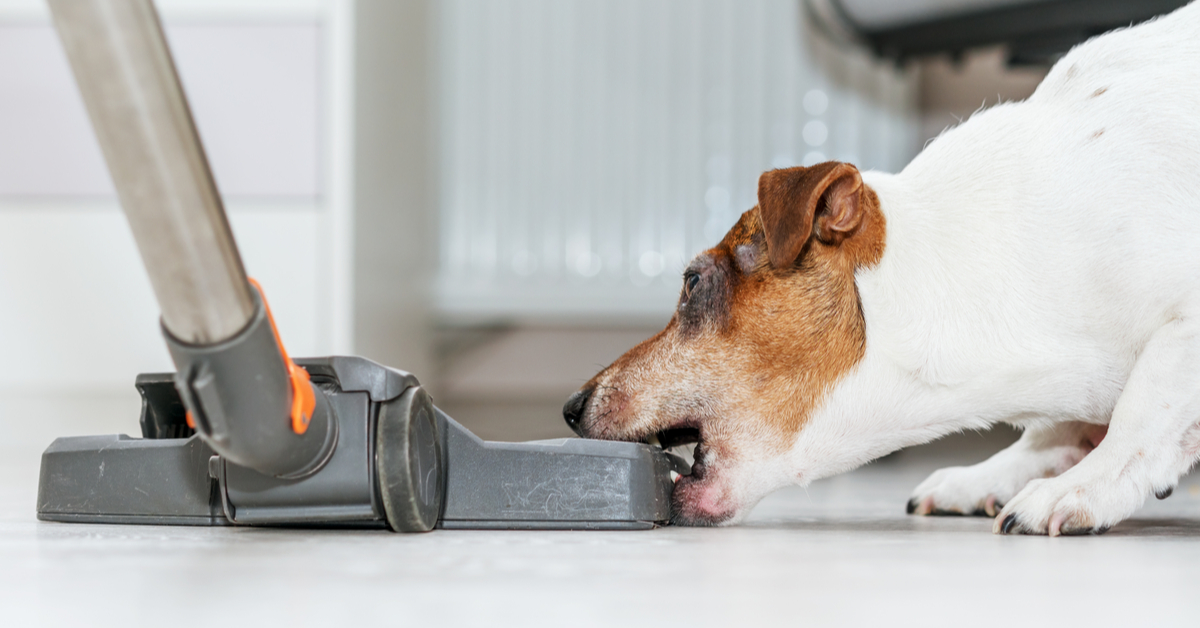
If you have carpet in your house, it’s helpful to vacuum it several times a week to prevent fly infestations. Flies will often lay their eggs in the carpeting. You can’t see them, but if you have problems with flies, they’re there.
Vacuuming several times a week and emptying the vacuum bag outside can help prevent a new infestation.
Does your dog hate the vacuum? Learn why dogs hate vacuums and how to correct unwanted behavior around them when you need to clean.
Hang Up Fly Traps
You can use plants like venus fly traps or make a fly trap with sugar water to attract the flies. This is similar to traps you see for yellow jackets, but instead of meat, you use sugar water. The flies go in, but they can’t get out.
Use Natural Pesticides to Repel Flies

There are a variety of pet-safe products that act as natural fly repellent. They can also repel other insects like mosquitoes and gnats. The following are some good natural fly repellents:
- Citronella;
- Lemongrass oil – you can put this on your dog or in the area to effectively get rid of flies;
- Catnip – this has also been proven to repel flies;
- Coconut oil – this is another proven natural fly repellent you can safely put on your dog;
- Peppermint oil – you can put this oil around your home in areas where you suspect pests are getting in. It will repel aphids, beetles, caterpillars, fleas, flies, lice, mice, and moths. You just don’t want to put this on your dog’s skin.
What Not to Do to Get Rid of Flies
There are some things you want to avoid using when trying to get rid of flies. There are some insecticides that can be toxic. There may be some that are safe for your pet, but you should avoid using insecticides that are not explicitly made for dogs.
It’s also a good idea to dilute any of these kinds of chemicals when you do use those that are described as safe for your pet.
Fly-nal Thoughts
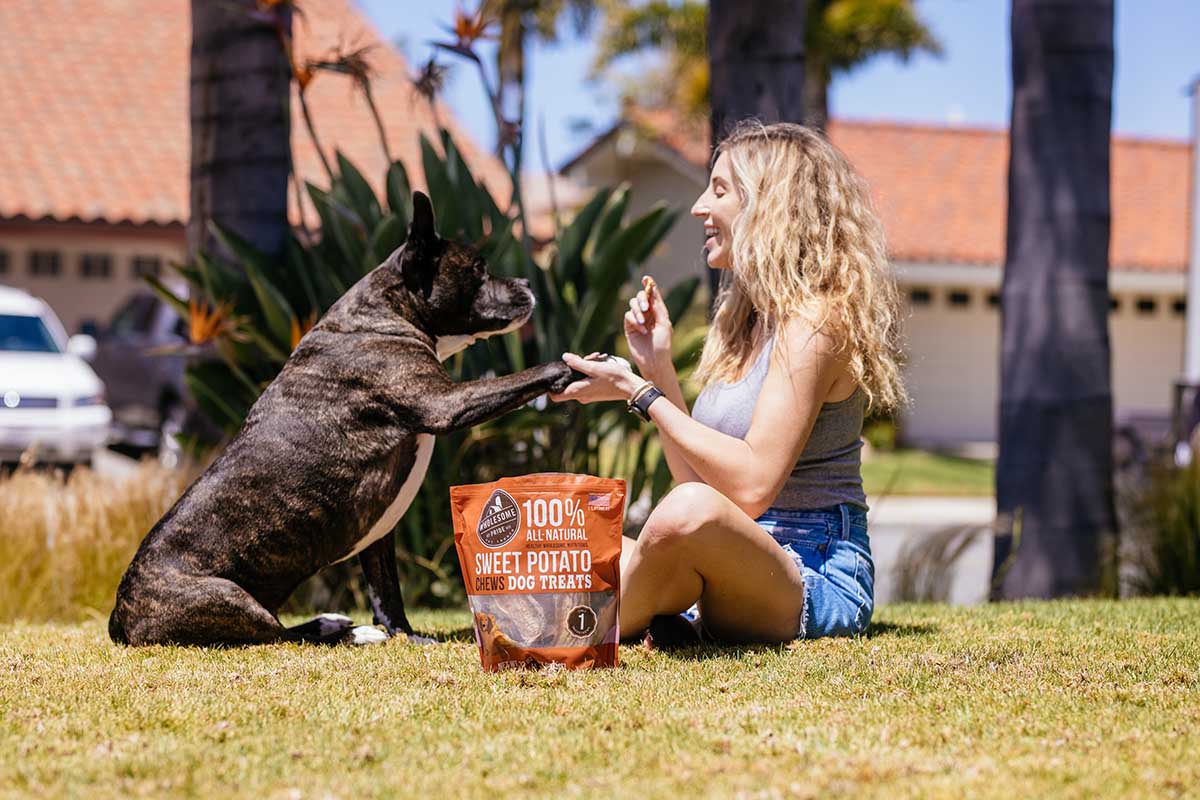
Biting flies are not only a nuisance for your dog, they can represent a genuine health problem. Flies like the deer fly can spread disease to both you and your pooch. That’s why it’s important to do everything you can to get rid of flies from your dog’s environment.
Keeping your pet and his environment clean will go a long way toward solving the problem, but it may also be necessary to use other means to repel biting flies and other insects that pose a genuine danger to your best friend.
